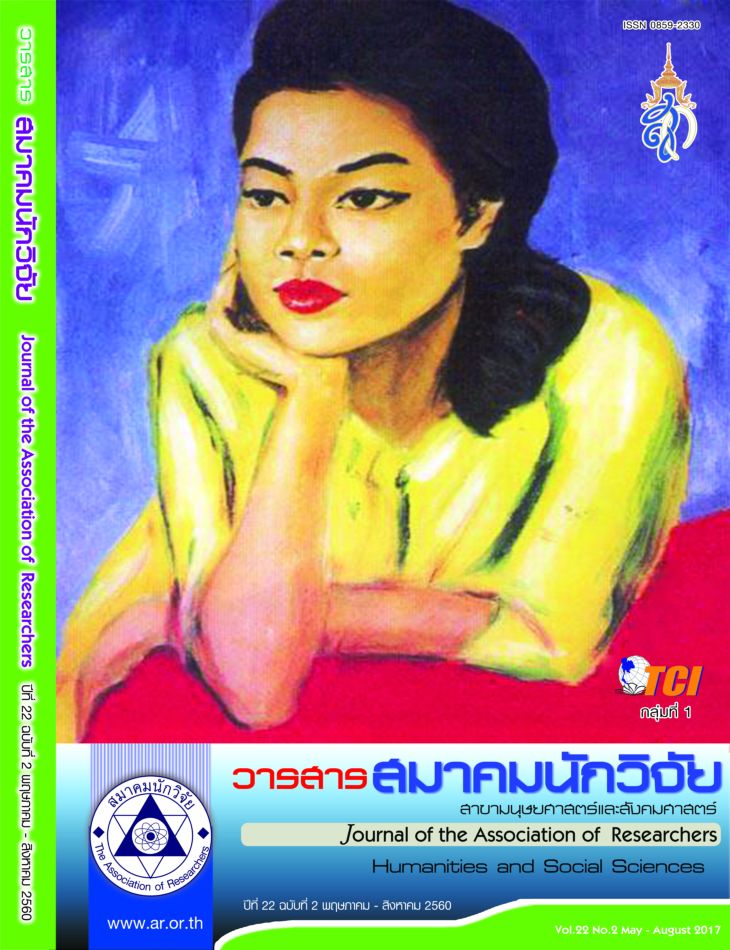Harmony Engagement in the Sufficiency Economy Village Module with Buddhadhamma
Main Article Content
Abstract
The objectives of this dissertation were: 1) to study the harmony engagement of the sufficiency economy village module, 2) to study the principles of Buddhadhamma supporting harmony engagement of the sufficiency economy village module, 3) to integrate the principles of Buddhadhamma in harmony engagement of the sufficiency economy village module, and 4) to propose a guideline and body of knowledge in harmony engagement the sufficiency economy village module with the principles of Buddhadhamma. The study used qualitative research method by observation, participation, in-depth interview and focus group discussion. The results of the study found that 1. The harmony engagement the sufficiency economy village module consisted of 4 main ways; Living a life together through activities and ceremonies, career and career network, social life and social activity interest, and culture
and custom conservation. 2. The most principles of Buddhadhamma supporting living a life together were Saraniyadhamma, followed by Aparihaniyadhamma, Sappurisadhamma and Sangahavatthu respectively. The most principles of Buddhadhamma supporting the village members’ career were
Saraniyadhamma, followed by Sappurisadhamma, Aparihaniyadhamma, and finally Sangahavatthu. The principles of Buddhadhamma supporting social association started with Saraniyadhamma and then followed by Aparihaniyadhamma, Sappurisadhamma and Sangahavatthu respectively. In culture and
custom conservation, the most principles of Buddhadhamma used were Saraniyadhamma, followed by Aparihaniyadhamma, Sappurisadhamma and Sangahavatthu respectively. 3. The integration of Buddhadhamma in harmony engagement of the sufficiency economy village module was not fixed but
depended on activities and members participating in each activity. Usually the use of Buddhadhamma was related to one another principle. 4. A guideline and a new body of knowledge on harmony engagement of the sufficiency economy village module with Buddhadhamma could be concluded into “MMMSH Model” which consisted of Mercy, Meeting, Management and Sacrifice leading to Harmony.
Article Details
บทความที่ปรากฏในวารสารนี้ เป็นความรับผิดชอบของผู้เขียน ซึ่งสมาคมนักวิจัยไม่จำเป็นต้องเห็นด้วยเสมอไป การนำเสนอผลงานวิจัยและบทความในวารสารนี้ไปเผยแพร่สามารถกระทำได้ โดยระบุแหล่งอ้างอิงจาก "วารสารสมาคมนักวิจัย"
References
นครินทร์ แก้วโชติรุ่ง. (2556). รูปแบบและหลักการของการปกครองในพระไตรปิฎก (วิทยานิพนธ์พุทธศาสตรดุษฎีบัณฑิต).มหาวิทยาลัยมหาจุฬาลงกรณราชวิทยาลัย.
น้ำทิพย์ พรพัฒนานิคม. (2554). “หลักสาราณียธรรมเพื่อสร้างมนุษย์สัมพันธ์ของนักเรียน โรงเรียนราชวินิตมัธยม เขตดุสิตกรุงเทพมหานคร” (วิทยานิพนธ์พุทธศาสตร์มหาบัณฑิต). มหาวิทยาลัยมหาจุฬาลงกรณราชวิทยาลัย.
พระครูนิกร สุนทรกิจ (สมพงษ์ นุ่มสกุล). (2554). “การสร้างความสามัคคีในคัมภีร์พุทธศาสนาเถรวาท” (วิทยานิพนธ์พุทธศาสตร์มหาบัณฑิต). มหาวิทยาลัยมหาจุฬาลงกรณราชวิทยาลัย.
พระธรรมโกศาจารย์ (ประยูร ธมฺมจิตฺโต). (2559). พุทธวิธีบริหาร. มหาจุฬาลงกรณราชวิทยาลัย. กรุงเทพมหานคร.
พระปลัดประจวบ ทุนผลงาม. (2550). การประยุกต์ใช้หลักพุทธธรรมในการพัฒนาชุมชนของพระครูพุทธิธรรมรักษ์ (บุญเท็นพุทฺธรกฺขิโต). การค้นคว้าอิสระศิลปศาสตรมหาบัณฑิต. มหาวิทยาลัยเชียงใหม่.
สุวิชาน พัฒนาไพรวัลย์. (2550). การดำรงความเป็นชุมชนปกาเกอะยอท่ามกลางการเปลี่ยนแปลงทางด้านทรัพยากรเศรษฐกิจและความสัมพันธ์ทางสังคม. วิทยานิพนธ์ศึกษาศาสตรมหาบัณฑิต. มหาวิทยาลัยเชียงใหม่.
Reference
Thanom Muangklom. (2010). Evaluation of the effectiveness of the Sub district Administrative Organization:Case Study of Samutsakhon Province, Muang District, Kokkrabue Sub district AdministrativeOrganization. Term Paper of Master’s Degree. Nation Institute Development Administration.(in Thai).
Nakarin Keawchotechueng. (2013). Format and principle of Buddhist Scriptures Administration. PH.D.Thesis. Mahamakut Buddhist University. (in Thai).
Namthip pornpattananikom. (2011). States of Conciliation for Create Student Relationship : MathayomRachawinit School. M.D. Thesis. Mahamakut Buddhist University. (in Thai).
Nikorn Sunthonkit. (Sompong Numsakul). (2011). Harmony Engagement in the Theravada Buddhist Scripture.M.D. Thesis. Mahamakut Buddhist University. (in Thai).
Kosajarn. (Prayoon Thammajitto). (2016). Buddhist Method Management. Mahamakut Buddhist University.Bangkok. (in Thai).
Prajuab Tunpon-ngam. (2007). Application of Buddhist Principles in Community Development ofPhuttithammaruk preacher (Boonten Puttharakakhito). Independent Study of M.A. Cheangmai University. (in Thai).
Suwichan Patthanapraiwan. (2007). Maintaining a community of Pakakeayoa Through the changes in economic resources and social relationships. Thesis of M.A. Cheangmai University. (in Thai).


